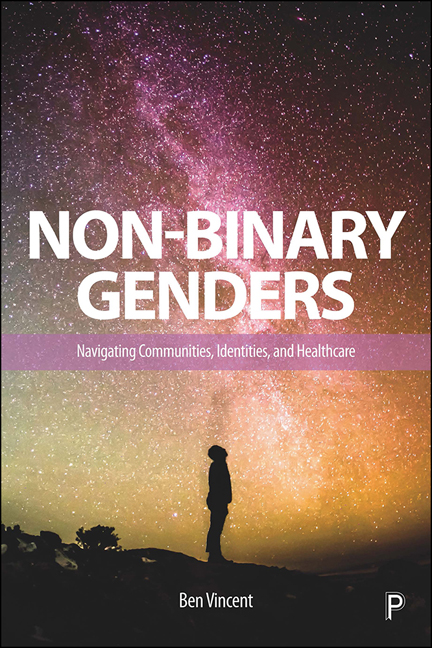Book contents
- Frontmatter
- Dedication
- Contents
- List of Figures and Tables
- Notes on the Author
- Acknowledgements
- Introduction
- 1 Reviewing Non-Binary: Where have we Come From?
- 2 Doing and Being: My Relationship with this Work, and how it was Done
- 3 ‘Not Trans Enough’: The Relationship Between Non-Binary Gender Identities, Uncertainty and Legitimacy
- 4 Non-Binary Times, Non-Binary Places: Communities and their Intersections
- 5 Views of the Clinic: Non-Binary Perceptions and Experiences of General Healthcare Services
- 6 A Strong Motivation to Tick The Boxes: Non-Binary Perceptions and Experiences of Gender Identity Clinics
- Conclusion
- References
- Index
Conclusion
Published online by Cambridge University Press: 10 March 2021
- Frontmatter
- Dedication
- Contents
- List of Figures and Tables
- Notes on the Author
- Acknowledgements
- Introduction
- 1 Reviewing Non-Binary: Where have we Come From?
- 2 Doing and Being: My Relationship with this Work, and how it was Done
- 3 ‘Not Trans Enough’: The Relationship Between Non-Binary Gender Identities, Uncertainty and Legitimacy
- 4 Non-Binary Times, Non-Binary Places: Communities and their Intersections
- 5 Views of the Clinic: Non-Binary Perceptions and Experiences of General Healthcare Services
- 6 A Strong Motivation to Tick The Boxes: Non-Binary Perceptions and Experiences of Gender Identity Clinics
- Conclusion
- References
- Index
Summary
I certainly believe that we can move toward de-regulating gender and still engage in important corrective practices like gender-based affirmative action. I am not arguing for a gender-blind society in which all people are similarly androgynous, but instead for a world in which diverse gender expressions and identities occur, but none are punished and membership in these categories is used less and less to distribute rights and privileges. (Spade, 2003: 29)
Summarising the narrative
This book has sought to address how non-binary gender identities are negotiated, within the contexts of heterogeneous queer communities and medical encounters. The academic foundations for this research were in both the sociology of health and illness, and transgender studies (most notably, an empirical sociology of trans experiences), with my approach to sense making and epistemological conceptualisation drawn from symbolic interactionism (Jackson and Scott, 2010) and social constructionism.
The research questions that were centralised within this study asked how non-binary people are involved with, and integrated into queer communities – where queer is used in a broad and holistic sense, near-synonymous with LGBTQ. If anything, my use of queer is sometimes broader, through the relevance of communities not specifically oriented with regard to gender or sexuality, but providing challenges to social norms, or opportunities to examine personal relationships with gender (and/or sexuality). In accessing such narratives over time through participant diaries, and also further reflections within semi-structured interviews, the data allows for broad consideration of how the increasing visibility of non-binary people within queer communities is accommodated (or not). From this, changes or necessary developments may be implied for the organisation of communities, and activism that is centralised within and around such communities. Further, this project's research questions examined how non-binary people negotiate access to and use medical services, at both the level of general, primary care for any ailment, and in the context of medical gender transition via a GIC. Concerns and social meaning ascribed to such interactions were considered broadly, such that discourses within the non-binary population were engaged with whether or not participants were currently seeking or accessing particular forms of medical care. The experiences and perceptions of the non-binary participants allowed for assessment of how current healthcare provisions for the non-binary population are viewed or experienced, and what implications this has for future provisions and potential methods of improvement.
- Type
- Chapter
- Information
- Non-Binary GendersNavigating Communities, Identities, and Healthcare, pp. 197 - 214Publisher: Bristol University PressPrint publication year: 2020



